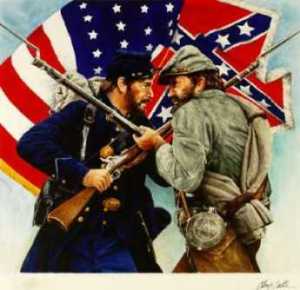By Mike Cronin
Ronald Reagan once said that government is not the solution to our problems, government is the problem. What did he mean by that? After all, he was president at the time; surely he must have felt that at least some government is good and necessary. As I have expressed in previous posts, our government has become dysfunctional. Just as cancers are flawed cells that grow uncontrollably, consume resources, and displace healthy tissue, dysfunctional government supplants healthy government. This is what Reagan was referring to. How is our government dysfunctional? In my opinion, there are four major, interlocking branches of dysfunction: Slavery, war, confiscatory taxes, and currency debasement. In turn, these branches of dysfunction are fueled by ignorance and ambition to power.
Our government was established to protect our rights to life, liberty, and the pursuit of happiness, but dysfunction was present right from the start. The founders articulated the notion that all men are created equal – but they didn’t recognize slaves as wholly men. Slaves counted only as 3/5ths of a person. Our nation began its life trying to cope with a terrible cognitive dissonance and human injustice – one that would cause arguably the greatest existential crisis it has yet faced: the Civil War.
You might argue that the Civil War was about states’ rights, not slavery. Well, there was one “state right” in particular that the South’s economy relied on: slavery. The Southern States seceded in order to hang on to the institution of slavery, but President Lincoln would not tolerate the dissolution of the union, so the first dysfunction led to the second: war. While Lincoln is widely hailed as the Great Emancipator and one of our best presidents, he assumed virtually dictatorial powers during the war, and expressly violated the Constitution and the Bill of Rights, thus setting precedent to his successors that might wish to do the same. One example: Lincoln ordered two newspapers critical of him to be shut down and had their owners and editors arrested for disloyalty.
While the aftermath of the Civil War may have seen the restoration of the country and the abolition of one form of slavery, it did not absolve us of the original dissonance slavery caused. It took another hundred years before the law and most of the nation accepted the full humanity of blacks, but vestiges of racism still haunt us, and our presidents still exercise more power than the Constitution allots them.


Great article. Just a note of warning though: saying, “Slaves counted only as 3/5ths of a person,” is a bit misleading. The 3/5 clause in Article 1, Section 2 is referring to population tallies for the House of Representatives. The southern states (more or less) wanted to count slaves as a whole person for this purpose but deny them the right to vote. The northern states (more or less) didn’t want them to count toward representation at all because it would give the southern states undue and unrepresentative power in Congress. Three-fifths was the compromise.
Revisionists like to slam our founders saying that the 3/5 clause proves that they didn’t think blacks were equal to whites or fully human, yet once again the facts are not on their side—as if facts ever stood in people’s way. 😉
LikeLike
Thanks for the comment, Rob! While the purpose for counting slaves as 3/5ths of a person was, on the surface, a compromise over electoral apportionment, the essence of my argument isn’t how slaves were counted, it’s that they were denied their rights from the outset, i.e. they were not treated as fully human, and that created the first “branch of dysfunction” in our government. That dysfunction follows from the premise that, if one purports to believe in individual rights,as our founders articulated them, then one cannot abide the enslavement of other people. There should have never been a question as to how to count slaves, because, if the founders were to act in accordance with the principles they espoused, they should have freed all the slaves then and there! Instead, realizing that probably would have meant a civil war, the founders and their successors kicked the can down the road for nearly three quarters of a century, resulting in the Civil War!
LikeLike